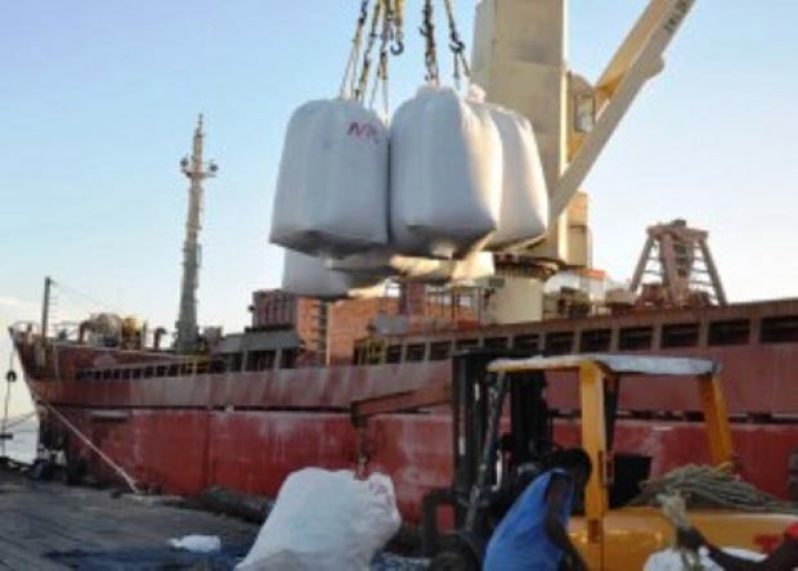Headway being made to secure new export markets
RICE farmers over the weekend, in Region Two (Pomeroon/ Supenaam), protested the drop in prices being offered by millers for paddy for the spring crop.However, General-Secretary of the ruling party, Clement Rohee, stressed the party’s and the current Administration’s commitment to the sector and disclosed that some headway is being made to access and secure new export markets.
At a press conference on Monday, which was held at Freedom House, Rohee could not indicate a time frame for when these new markets will come on stream, but he stated that stakeholders are working “aggressively” to secure these.
The dilemma facing the sector presently is that while production has increased, new markets have not opened up simultaneously and this has resulted in a decrease in the prices being offered by millers. Compounding this challenge is the fact that some 100,000 tonnes of paddy from last year’s final crop, the autumn crop, is still to be sold.
“We must work hard to address this problem” the PPP General-Secretary said.
The Ministry of Agriculture’s approach to improving access to markets is centered on a three-pronged approach: increasing the market share in countries that have agreements with Guyana; re-entering old markets where the country once had a meaningful presence; and securing new markets.
Rohee said, “The Government and GRDB (Guyana Rice Development Board) will be engaging Belize, Guatemala and Brazil in purchasing rice from Guyana.
“The Minister of Agriculture will be leaving shortly to Latin America to pursue markets in that region…also the Haiti market requires 100,000 tonnes of rice, negotiation on ongoing.”
He added that moves are also being made to finalize the annual export agreement with Venezuela, with the Purchase Order being the only document still to be signed.
Once the agreement is finalized, the neighbouring country is likely to take 110,000 tonnes of white rice and 80,000 tonnes of paddy.
FOOD SECURITY
The General Secretary defended the ruling party’s focus on rice, on the basis of its quintessential role when it comes to food security, which he stressed is critical for a country like Guyana.
He said, “Sustained developments (in the sector) have seen new factories, thousands of acres of new land being cultivated, sustenance of traditional markets and new markets, such as Venezuela.
“It must be recalled that rice was always a priority of the PPP-led Administration even before Independence. The emphasis was and continues to be on the welfare of the farmers and the infrastructural development.”
The achievement of food security was the basis on which the Jagdeo Initiative, a regional programme, was conceptualised by former President Bharrat Jagdeo, who was responsible for agriculture in the Caribbean Community (CARICOM).
The initiative identifies and defines nine key, critical and binding constraints to the development of the agriculture sector in the Caribbean region and practical interventions at the regional and national levels to alleviate those constraints. This ‘new agriculture vision’ aims at making the sector more than food production by exploring the numerous opportunities that exist for agro-businesses which will create more employment, increase export earnings and the income of all stakeholders, especially farmers.
The local rice industry, with policies informed by this initiative, continued to stand in the face of the negative global economic changes to shoulder food security, gain export strength, and provide steady employment opportunities for Guyanese.
The production for 2013 was 535,212 tonnes, which was far above the original target of 413,000 tonnes, and reflected a 27 per cent increase over the production in 2012. The average production per hectare is five tonnes.
Rohee said, “The rice industry’s strong showing over the years has also tremendously improved the lives of farmers, their families, workers and the communities at large.
“The support mechanisms provided by the Government, through the creation of the enabling financial environment and scientific research, are demonstrative of the PPP-led government unflinching commitment to development of agriculture, in this case the rice industry. It is also indicative of the importance our Party and the government it leads have attached to the development of the rice industry.”
With harvesting progressing at a significant rate in Region Two and started in the other rice producing regions, some 250,000 tonnes is expected to be reaped in this crop, with an average yield of 34 bags per acre.
(By Vanessa Narine)



.jpg)








